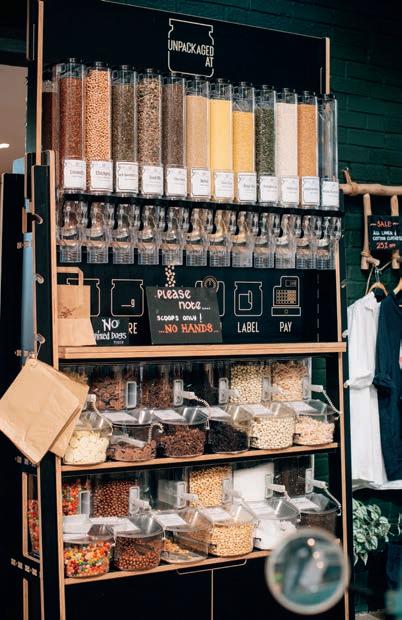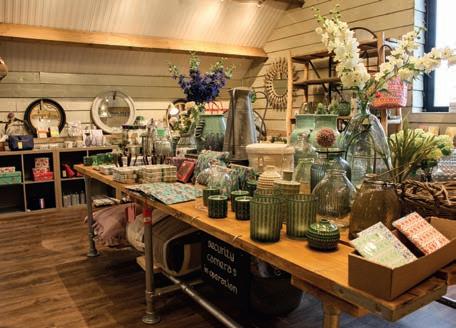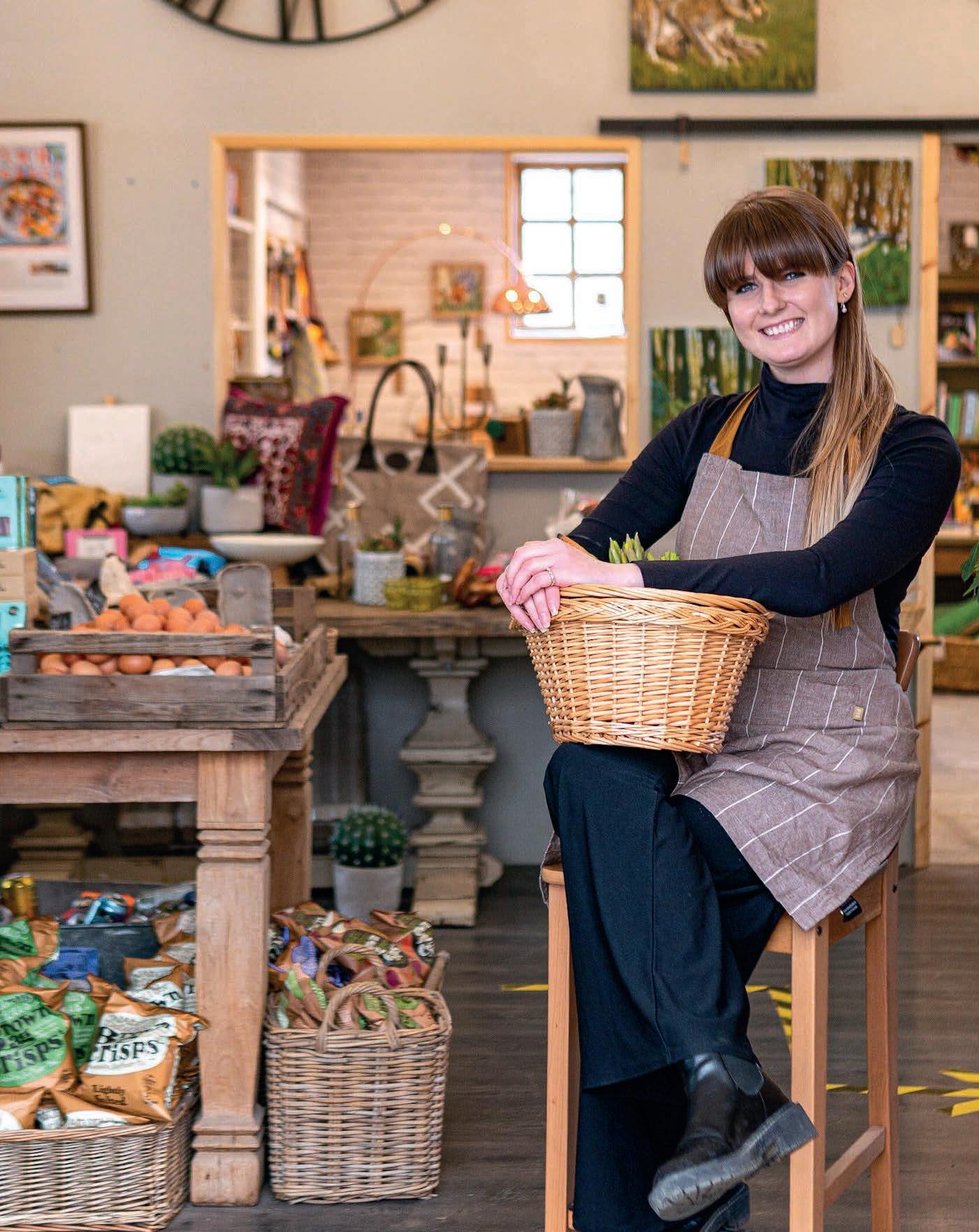
9 minute read
DELI OF THE MONTH
from FFD April 2021
Winning multiple awards in its rst two years of trading hasn’t led to any laurelresting from Charlie Wells, director of The Farm Stratford – a highly diversi ed former fruit farm turned food hall. And given her constantly evolving approach to concessions and other attractions, here...
Interview by Tom Dale
...it’s about the journey and the destination
WHEN FFD VISITED The Farm Stratford, a modern, spacious food hall just outside the medieval market town it takes its name from, families were venturing out into the drizzle a er picking up their essentials to check in on Pamela, the snoozing Gloucestershire Old Spot, the everhungry goats, the brood of hens, and the small ock of sheep.
Only the pigs will end up on the butcher’s counter – except Pamela; director Charlie Wells’ favourite – but all of the animals help to build the ‘destination’ that the nine-acre site has become in the two years since opening in April 2019.
And what a time to have begun trading. Wells says that by the time FFD is published, the shop will have been open under coronavirus restrictions for longer than it had not. This hasn’t stopped The Farm attracting the attention of the Farm Retail Association, picking up its Rising Star award in 2019 and, in the days preceding FFD’s visit, winning Small Farm Shop of the Year and Café of the Year for its restaurant, Nourish. The likes of Suitcase Magazine, Condé Nast Traveller and The Guardian have also helped to raise the pro le of the burgeoning business.
“The one that got us noticed was The Guardian article,” says Wells. The piece implored motorists to avoid the traditional service stops and head a little further to a farm shop. “Overnight, that got traction. The next day we had a noticeable rise in customers.”
All these will have helped put the family business on the map, but it’s Wells’ dedication to diversi cation that’s turning it into the destination it is unmistakably becoming, even during the third national lockdown.
The Farm’s story started back in 2017 when the Wells family decided to transform a derelict former fruit farm in the village of Snitter eld into a food hall with a focus on sustainability and Cotswolds-sourced fresh produce.
A er initially encountering some resistance from planning authorities and locals, both were won around by the family’s plans. “The residents all thought it was going to be a huge supermarket and they weren’t happy. But when they saw the drawings and that we were keeping a bit of the rural heritage they were on board.”
With £3million capital investment, including the acquisition of the land, the neglected site was transformed into a fresh retail environment maintaining a rural feel. Using 95% recycled wood and keeping all the original brickwork and
VITAL STATISTICS
Location: King's Lane, Snitterfield, Stratford-upon-Avon, Warwickshire Turnover: £1.7-£2m (projected 2020/21) Number of line: 3,500 Retail floorspace: 1,000 m³ Gross margin – shop: 55% Gross margin – restaurant: 68-70%


ooring, as well as the family doing as much in-house as they could, helped keep costs down. Wells says her father and co-director Richard’s former career in civil engineering proved useful, too.
Turning over £1.5 million in its rst year’s trading is no mean feat, but the diverse appeal, large restaurant, and family-friendly environment must have all played a part.
“It’s been amazing, an absolute whirlwind,” says Wells. “On our opening day, we had 9,000 people turn up. It blows my mind even now.”
And – although many visitors had come to check out what in Wells’ words was one of the only big, new, independent businesses to open in the area for years – that appeal has stuck.
The food hall’s varied concessions – Swirls Gelato, chocolatier The Slab, Vin Neuf wines, Barrell & Bone fermented foods and a collaboration with Neal’s Yard Dairy – each provide a draw independent of the food hall itself, all being previously successful local businesses. The Farm’s butcher, the awardwinning Crombies, and shmonger, The Pickled Crab, are also concessions.
“Nigel [the shmonger] had a great following beforehand so we knew it would be a bene t for both of us bringing in someone already established,” says Wells. She tells me that initially, they looked a er the sh counter inhouse, but some weeks it would only make £20 due to waste. “Now Nigel will make £20 in one sale.”
She says his good following, both among the community and on Instagram, and excellent branding, have helped attract a di erent “younger and more foodie” crowd from nearby Leamington.
The image-sharing platform is something that the 28-year-old director swears by and has built up a great following through. “It’s the best marketing tool for us.”
People respond to visual media, she says, and this is a great way to sell your products and the idea of your business, especially during COVID, and the director even uses it as her primary product-sourcing tool.
While initially the model was employed to help drive footfall to the new outlet, the concessions at The Farm pay a fee to rent the space, and then a percentage of each sale on top of that at a at rate, so now they are both a boon nancially and in visitor numbers.
Wells is not in exible in the approach, though. The business formerly included a orist franchise, which has since le by mutual agreement. “It looked beautiful, but it didn’t work nancially. She didn’t sell enough owers to warrant the space and the waste,” says Wells.
Since then, to replace the o er, The Farm has begun selling houseplants, buying in just £100-worth at rst, then, when that stock sold out immediately, growing it week by week. “It just looks cleaner and fresher and has worked well. That’s now led to us building a garden room – we’re having an indoor greenhouse sort of vibe with fresh plants and a small range of owers, mixing it in with books.”
This trial-and-error ethos has served the director well since opening. “The sta say I should get the phrase tattooed on me,” she says. “But it works for us. I always listen to the sta if they think that there is something not right, or if they think that the layout isn’t working or make a comment that we haven’t been selling a lot of something and they think we should move it, we make a change.”
One such change is the recent switch from standard shelving to large, open ‘360’ units, made with old sca olding and boards. FFD can attest to the uncluttered, airy feel it gives the food hall, and the unintimidating appeal it gives to what is a large range of products.
Another upcoming experiment for the business is a 1950s Airstream camper set to be rented by prominent Warwickshire hairstylist MUST-STOCKS
FILL laundry & household products
Unpackaged zero-waste refills Purity Beers Neals Yard Dairy cheese Fresh orange juice from our Zumex machine Tubby Toms Hot Sauce The Slabb chocolate bars
Cacklebean Eggs Blackfords Limoncello
Diforti cannoli

Nashwhite. “It’s growing that destination feel,” says Wells. “Destination is the perfect word for what we’re trying to create here.”
During ‘normal’ times an array of courses are run from an annexe: jewellery-, candle- and wreath-making, oristry workshops and The Farm cookery school. “Gi ing ‘experiences’ was such a growing market and was very popular, and then it completely shut down,” says Wells. Though despite courses being postponed, only ve customers have asked for refunds. The rest are set to rebook as soon as restrictions make them nancially viable.
Adding to the more-than-a-farm-shop o er are the retailer’s small menagerie, a children’s play area lying adjacent to Nourish, a range of summer events, and a market garden which, while mainly an attraction and educational tool for Flourish at the Farm (an alternative education provider focusing on children with special needs), also serves as a herb garden for the butchers and chefs.
“The customers love to see the guys out there picking the herbs, it’s a great conversation starter and a reminder of our circularity,” Wells says. “The dream is to go for the Green Michelin Star.”
This sustainable approach is at the heart of The Farm’s ethos and is a passion for Wells. The family wanted a green focus from the outset. As previously stated, the build used 95% recycled wood and retained the original brickwork and ooring where possible, and a 20,000-litre rainwater-harvesting tank was built under the sta car park, providing water for the garden, chilli farm and ushing the toilets. “It’s only failed us once, last summer when we had a bit of a drought,” Wells tells FFD. The building also has 300 solar panels which provide the equivalent in electricity of running 80 kettles for eight hours a day, she says. “That’s the language that customers want to know – you need those visual concepts.”
Where possible, the produce on sale is sourced locally, The Farm’s meat supplier, Lordswood, is “practically our neighbour” says Wells, and has a focus on rare breeds and sustainable farming, and the food hall boasts an impressive re llables area. Here you can nd packaging-free staples and sweet treats from an Unpackaged unit, milk, cleaning products, and shower gel and shampoo, and there is currently a re ll oat milk station on its way. The business has also committed to avoiding plastic where possible – no plastic bags are used throughout the store, and the café uses compostable vegware.
“I think that everyone should be aware of sustainability by now and everyone should be working it into their businesses,” she says. “But most importantly, the customers love it.”
As covered in our last issue, the numbers of consumers actively seeking greener retail options is growing rapidly, and this is borne out by Wells’ observations. And if that wasn’t enough to tempt them, The Farm encourages take-up of its zerowaste options by o ering customers 10% o for bringing their own containers. “The margins are great, so we can give them back that little extra to encourage them.”
So, what’s next for the double award-winning farm shop and restaurant? Apprehensive about the return to normality that is potentially on the horizon a er trading for more time in a COVIDridden world than not, Wells says she will be maintaining many of the hygiene measures that have been put in place, despite the extra cost. “I’ve almost forgotten what normal retailing is like,” she says. But that hasn’t stopped the motivated owner from planning a co-working space, a tness and wellbeing suite, and a scheme that will utilise the Farm’s large outdoor grassy area.
Inevitably not all these will work exactly as intended, but if the business’s trial-and-error attitude continues, surely the destination will be as important as the journey.
thefarmstratfordshop.com













